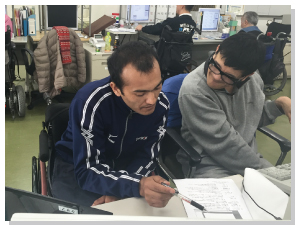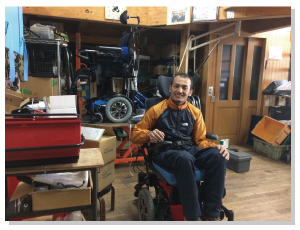- HOME
- Alumni News
- Keshav Thapa (participated in the 18th Program)
- Keshav's Final Report
Keshav's Final Report
Final Report
My first trip to Japan as a Duskin leadership trainee
On September 11, 2016, I arrived at the Kansai International Airport as a 18th Duskin leadership program trainee. It was a great moment to meet the staff from the Duskin AINOWA Foundation and Japanese society for Rehabilitation of Persons with Disabilities (JSRPD). Then followed another great moment of meeting other trainees from different countries. At the beginning, there were many things that surprised me in Japan, the environment was so different from that of Nepal. For example, buildings, wide roads, traffic, and all people seemed to rush.
Japanese classes
Before coming to Japan, I could understand only some Japanese greetings. Therefore, learning the Japanese language and its letters was really exciting for me. I could understand hiragana and I was able to write my name in Japanese katakana. Hiragana were the only letters I could understand but the words were unknown for me. For the first few days Japanese tones sounded too strange, and I found it very difficult to pronounce them as well remembering them but after nearly 3 months, I could communicate in simple Japanese and write simple sentences. I was so impressed with the teachers’ teaching methods. Because of their good guidance and my own hard work, my Japanese gradually got better. Japanese classes were always so fun because our different pronunciations and the teaching method never bored me. I made some Japanese friends and had good correspondence with ex-trainees so they helped me practice speaking Japanese. I was happy when I learned that I had passed the N5 examination in a very short time.
Swimming and ski training
I became physically disabled in 2011. My disability is spinal cord injury at levels T6 and T7. Before my accident, I sometimes went swimming but after becoming disabled, I did not swim until I came to Japan. For the first two days, I drank lots of water and it was really a very different experience to swim after becoming physically disabled. After a few days’ training, I learned swimming and by the end of the training I was swimming by myself.
For ski training we went to Niigata. I had only seen skiing on television. I was so excited to get the wonderful opportunity to do 2 days of skiing. Snow was not new to me but I didn’t know how much fun it would be. Words cannot explain how exciting it was. I fell many times but was so glad to be the part of such an adventurous sport
Individual training
At the beginning of the individual training, I went to Tsukuba Honyara Center for Independent Living for one week. It was my first visit to a center for independent living in Japan. During my one-week training at Honyara I got to know a little about CIL activities and the life of persons with disabilities in Japan. That time my Japanese was not so good but all the staff, especially Saito-san Kawashima-san and Namai-san, helped me lot. Because of the technology, language was not a big problem, using Google Translate being just one example. My first individual training at Honyara was brilliant. I enjoyed learning many new things. For my one-week individual training I went to Human Care Association, studied the concept of independent living centers, and their movements and activities for people with disabilities. Before coming to Japan, I had limited knowledge about independent living centers so everything was importance to me. My own thinking also began to change and I gave a lot of thought to my future.
I had a very fruitful and important time at DPI Japan. I got to know about UNCRPD and relationships between international DPOs. At DPI, I learned the real struggle of persons with multiple disabilities to get their rights and had a chance to watch a video about a Japanese barrier free project.
At Kanagawa General Rehabilitation Center and Spinal Injuries Japan, I wanted to know about rehabilitation processes of people with spinal cord injuries in Japan and their life and self-care after injury. I found the rehabilitation process of Japan was not so different from Nepal but Japan had much more equipment. Spinal Injuries Japan is investing huge amounts of money into research of treatment of spinal cord injuries.
I had a very good time training at electric wheelchair company Saito Kobo Ltd. Apart from wheelchair maintenance, I learned from Habib-san and Saito-san about Japanese welfare system to provide wheelchairs to those in need. I also obtained some knowledge about the Sakura Wheelchair Project.
I went to Osaka for two months and a half. For the first three weeks, I stayed at Center for Independent Living ”Partner”, where I learned about various disabilities and more activities about independent living centers. All staffs and member were so kind. I got to participate in various meeting and sports including wheelchair basketball, table tennis and bowling. I also had a lot of delicious food and saw amazing sights in Kobe, Nara and Kyoto. I also visited some friends’ homes to know how people with disabilities were living an independent life. I want to thank Chimura-san and all the staff and members of Partner for such a wonderful experience. After 3 weeks at Partner, I went to Mainstream Association for 4 days. In such a short time, I learned so many things from such wonderful friends and my mentors Kadota-san and Hirata-san. During my training at Mainstream, I stayed three nights as the home of Furuki-san which was another wonderful experience. Furuki-san gave me a lot of encouragement. Kadota-san’s struggle for creating an accessible environment is much to be appreciated. I also learned about Kokorozashi Network and its activities and support to Asia’s CIL centers. After that, I spent three weeks at the Center for Independent Living Movement. The three weeks passed so quickly, with wonderful people, visiting not just the wheelchair manufacturing company but special school for students with disabilities, a disability sports center, Independent Living ”MUCHU” Center and many others. I gained a lot of confidence and knowledge. I want to convey my gratitude to all members and staff of Movement, especially Fuchjigami-san for the warm hospitality.


My future goal
In Japan, I had many opportunities to learn about important services, welfare systems, disability laws, human rights and much more. During the 10-month training, I got to meet so many Japanese disability leaders and hear from them how the condition of Japan was around 1965. In my country, accessibility is a very big problem so my main target is to negotiate with the government and government agencies about physical infrastructure, education, road division to bring accessibility for all types of disabilities. I also want to work on education, employment and welfare system for persons with disabilities, personal assistance services for people with severe disabilities and on independent living concept.
Conclusion
The group training and individual training were very good. Sometimes individual training was very short. I got to meet many people with different disabilities, and hearing stories of real heroes and leaders of disability movement gave me lots of energy. I realized that I had been wrong all the time believing there were many things I could not do because I was disabled. I realized that it was not my fault to be disabled. I met many leaders with very severe disabilities and learned disability itself is not a problem, rather the problem is societal, and that we need to change the society’s thinking. I also began to understand that, instead of leaving everything to specialists, we can live in the same community, with equal rights, equal participation, and dignity. I understood that making decisions about our own lives and creating a good environment to live in are in fact our own job. The best thing about the individual training was that I made many friends in Japan. Friends are the most important thing. After returning to my country, I am going to utilize the knowledge and experiences I gained in Japan.
Thanks...
Last but not the list, I would like to express my heartfelt gratitude to the people who helped me or supported me during this prestigious international training program. The Duskin AINOWA Foundation has given us such a wonderful platform to learn important things. Thank you to all the staff of JSRPD and Toyama Sunrise. My respect to Nasu-san, Mitsuoka-san, Saito-san, Chimura-san, Fuchigami-san, Nakanishi-san, Kadota-san, Habib-san. And thanks to all the people who directly or indirectly helped me in Japan. Thanks to you all!!




